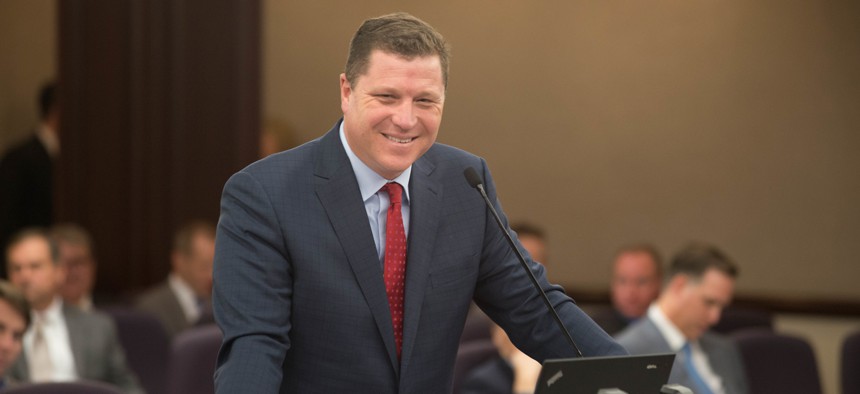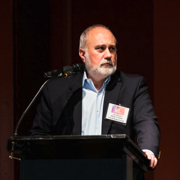Five Questions for state Sen. Jeff Brandes
The outgoing lawmaker talks about voter fraud, the perilous state of property insurance, and life after the Legislature.

Florida Senate Photo by Darryl Jarmon
Come November, Jeff Brandes won’t be “taking them to the woodshed” as an elected official. The Pinellas Park Republican is term-limited out of the state Senate after 10 years there, which followed two years in the House. He became known for the “woodshed” slogan during campaigns; Brandes grew up working in his family’s lumber yard. The Army veteran, who served in the Iraq War, also gained a reputation as a maverick in his own party for his more libertarian positions.
His lack of lockstep continued through his final legislative sessions this year, including the special session on insurance that he said didn’t go far enough to stem what he called a “man-made disaster.” Criminal justice reform also became a passion of his. After voters in 2018 approved a state constitutional amendment that “restores the voting rights of Floridians with felony convictions after they complete all terms of their sentence,” Brandes sponsored the “implementing bill” that required eligible felons to first pay outstanding fines, costs and restitution.
Those convicted of murder and sex offenses can’t automatically vote under the amendment, but Gov. Ron DeSantis recently announced charges against nearly two dozen ex-cons who still managed to register and vote in 2020. That sparked a tweet from Brandes: “It was our intent that those ineligible would be granted some grace by the state if they registered without intent to commit voter fraud. Some of the individuals did check with SOEs (referring to county supervisors of elections) and believed they could register.”
With that, City & State has five questions for Jeff Brandes (questions and answers have been edited for clarity and brevity):
You’ve tweeted recently about the need for “grace” in light of the arrests of felons who have been recently charged with voting illegally. How did the felons voting issue go so far off the tracks?
Well, I think nobody was checking at least early on the voter registrations that were coming in at the Secretary of State's office to determine whether they were on the (prohibited voters) lists. You know, it's pretty clear that the people that were arrested were either sex offenders or were people that were convicted of murder. Those seemed pretty easy to check, and to verify that the person named on the voter registration was not convicted of one of those crimes. But these individuals were still given voter ID cards by their supervisors of elections. If you get a driver's license from the government, you'd think you would be able to drive. You get a voter registration card from the government, you would imagine you would be able to vote. And so these people went out, voted illegally and now have been arrested. There have been multiple claims about who's at fault, whether it's the local (officials) or whether it's the state. And the more evidence that comes out kind of identifies that the state made some mistakes here.
Recognizing that we had essentially 60 or 70 years of records on microfiche in some back storeroom that would then have to be digitally converted for every felon in every one of the 67 counties seems like a herculean task to do in the time between the constitutional amendment was put in place and the time it was implemented. Most of the newer court records are very easily accessible but the older ones are really where we run into problems, and it's going to take a lot of work and a lot of resources in order to get those accurate and online, because even if you put them online, they're largely not likely to be accurate.
Most of these people probably had no clue what they were doing. They thought, “Hey, I'm a former felon and I've completed all terms of my sentence and I've got my right to vote restored.” But they aren't attorneys. Some of these individuals I bet you're going to find probably have some difficulty reading. And so there's going to be some of these individuals who just could not have willingly and with knowledge violated the law. They may have accidentally done it, but that's where the state should have granted some grace. And that's why we put “willingly” in the law.
You’ve also been adamant about addressing the property insurance crisis in Florida. Can we ever dig ourselves out of the hole we’re in?
We can dig ourselves out, but understand, if you walk five years into the jungle, you don't turn around and walk out in five days. It's going to take time, but frankly, we have to turn around first. The Legislature has turned 40 degrees, but it hasn't turned 180. And it really needs to do some hard things. … The three things that need to be done are, one, get rid of assignment of benefits. Texas and North Carolina have done it, and the world didn't end. Two, get rid of one-way attorney's fees. And three, allow for actual cash value or a stated value on roofs. If you do those three things, you will see investors come back into the market and the market will begin to heal itself. But Florida can't be the most hurricane-prone state and also be the most litigious state. Those two things cannot coexist and we have lower property insurance rates.
What’s your take on the current state of politics in Florida?
Well, I think the overriding issue as in most midterms is that, frankly, the president of the United States is out of favor. And so I think Republicans are going to do very, very well this election cycle, not because people have turned against Joe Biden and don't like the policies but because, as was once said, “It's the economy, stupid.” We’re looking like we're heading towards recession. Inflation continues to be high and people are paying more for everything. I think they're ultimately looking for a change in leadership. And I think this governor (DeSantis) has already won reelection. I think the governor won when he kept the state of Florida open during COVID, when he kept kids in schools. I think that cemented him for another term.
As for all the culture issues, look, you have to understand he's playing a different game. He's working to become president of the United States. So every move he makes is toward that end, right? It's about getting recognized nationally, as much as it is (about) the issues of the state of Florida. So when you're holding everything up to the light of, does this help me win a presidential race, you take a different tack. And I understand that. I have to respect it. He’s one of the top contenders in the country right now.
More specifically, what’s your critique of the mainstream Republican movement in Florida?
I still think they lean too much on government. I still think they lean too much on the fact that the government is a part of the solution to some of these problems. The simple truth is, most of what the government does, it does poorly because it does too much. They need to focus on the things that only government can do. We don't have a great criminal justice system in Florida. Our prison system is a disaster. Look across the board at the different things the government is involved in, and none of them really work all that well. … At some juncture you have to pick the handful of things you're actually going to do well and focus on those … and let the rest of it go to the private sector.
What’s next for you after life as a lawmaker?
It’s called the Florida Policy Project. It’s nonprofit, bipartisan, and we’re going to work on four areas of public policy: Transportation, criminal justice, property insurance and housing affordability. Our goal is to be a best practices bank. … I hope that we can work with the governor's office as they begin to work on legislation and the leaders of the House and Senate. Most people walk away after 10 years in the Legislature and go back to their lives and they leave this rich knowledge that they've gained when they do that. For instance, my big takeaway after a decade of Tallahassee? So much of the policy is tactical and not strategic. There really isn't a larger strategy at play. … I'm just not ready to give up on policy. I love public policy. I love solving tough problems and the answers are out there. We just have to go find them.
We’re funding it through corporate donations and I'm putting some of my resources towards it. I’m getting a great team together and when we announce our board, you're going to be amazed. There are a lot of corporate individuals who just really want to solve problems. Some of them, there's really no nexus between what they do and these issues, but they want to see problems solved because they want Florida to get better. And in some of these areas we're so far away from the best practice, it's kind of shocking.
If you're not already signed up, get "First Read," City & State Florida's morning take on the news of the Sunshine State. Subscribe now at www.cityandstatefl.com/newsletters.
NEXT STORY: This week’s biggest Winners & Losers
